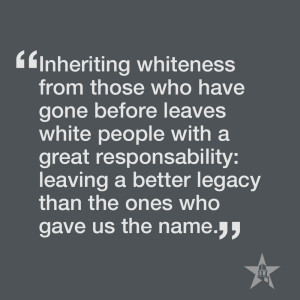Race is on our minds. The Black Lives Matter movement has brought Afro-American interests to our cultural consciousness, especially ones relating to our police force and courts. Some people are not a fan of this movement’s ideas or practices, and have tried to instead bring “All Lives Matter” or “Blue Lives Matter” to the forefront. Meanwhile, the recent election highlighted an important political line in the sand; that is, between white people (who made up a huge majority of votes for the Republican Party) and people of color (a huge majority of whom voted with the Democratic Party). Of course, race is sometimes an uncomfortable topic, and these things can be hard to talk about. However, in my experience, an important part of these discussions is left out far too often: whiteness.

It is widely accepted that racial categories, including that of “white,” are arbitrary distinctions that are sociocultural, not biological. Still, race is real. That is, since we all perceive people to be of different races (“black”, “white”, “Asian”, “Hispanic”, etc.) and treat them as such, it is an undeniably real part of each person’s experience of their life. More than that, we are all socialized by mass media, public education, and even each other to think and act like others of our race.
Many people of color I have spoken to about race can speak deeply and eloquently about their experience as a member of their race. For example, one black person I have known for years has many stories from her life that she uses to describe her own racially defined life. She shares them with humility, hoping to help people of other races to understand what it’s like to be a black woman in America. This is the case with almost all of the people of color I have close relationships with: they know what it means that their lives are racialized.
In contrast, I know very few white people who can do the same. For some reason, something in common with nearly all of the white people in my life is that they think and talk very little about their own racial experiences. This is a problem.
There are many things that white people have in common. White people all tend to have a Euro-centric view of the world, Germanic-Latin first and last names, similar hair and beauty products. Personally, it’s rare for strangers to be afraid of me, or for law enforcers (police officers, judges, security guards, etc.) to be suspicious of me. In fact, I’m automatically trusted in almost every context. I suspect this is also true for the white people reading this. As members of an individualistic culture that originally came mostly from individualistic cultures, it is easiest for us to see how we are each different. In reality, however, sharing a racial category gives us many experiences in common, for better or worse.
These experiences, and many others, have socialized us into a white worldview, one which is full of contradictions. We have been taught that American history is mostly the positive history of white Americans discovering land, creating many things (including democracy, airplanes, and nuclear weapons), and upholding freedom. Meanwhile, we all but ignore the fact that white Americans have consistently enslaved, murdered, deported, and imprisoned Americans of other races. We as white people live mostly in segregated communities and attend mostly segregated churches, and still think we are objective in our analyses of racial issues. We worry about Muslim terrorists, without doing much about white supremacists. The list goes on. White people, myself included, cannot help but see things most easily from a white point of view. We need to recognize and discuss whiteness for this reason.
 In suggesting that we talk more about whiteness, I definitely do not suggest that we move the focus of every conversation about race onto white people. In many cases, that sort of “but what about me/us/white people?” is distracting and unhelpful. I am simply suggesting that whiteness is an important aspect of American culture that we must confront.
In suggesting that we talk more about whiteness, I definitely do not suggest that we move the focus of every conversation about race onto white people. In many cases, that sort of “but what about me/us/white people?” is distracting and unhelpful. I am simply suggesting that whiteness is an important aspect of American culture that we must confront.
So what, realistically, should white people do? We can spend time reading and listening about the life experiences of people of color – there is much about this online – and comparing it to our own. We can talk with one another about ways that our whiteness leads us to believe partial truths (as all racialized people experience to varying degrees), and humbly ask people of color to speak truth in love.
Historically, whiteness has largely been used (and continually redefined) in America to separate “white” from “non-white” in very concrete ways (e.g. “master” from “slave”, “legal citizen” from “illegal immigrant”, “nice schools” from “bad part of town”). Inheriting whiteness from those who have gone before leaves white people with a great responsibility: leaving a better legacy than the ones who gave us the name. We can only do that if we know exactly what it means to be white.
Michael is a senior applied design and visual communication major.
